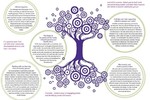The Community Development National Occupational Standards (CDNOS) 2009
The Community Development National Occupational Standards (CDNOS) underpins our work and aims to bring together the skills, knowledge and values for anyone who does Community Development. We understand Community Development as a learning process, which is why we aim to support our members in any aspect this involves.
FCDL's role in developing Community Development National Occupational Standards 2009:
FCDL worked in partnership with the Lifelong Learning Sector Skills Council, supported by a project steering group, to undertake the review that resulted in the Community Development National Occupational Standards 2009. Throughout the process of the review, FCDL and the steering group consulted with Community Development practitioners across the field and the UK to ensure that the knowledge, skills and experience is reflected in the CDNOS, as they define what is good quality Community Development work practice for the next five years or so.
The key purpose of Community Development, as described in the CDNOS:
Community Development is a long–term value based process which aims to address imbalances in power and bring about change founded on social justice, equality and inclusion.
The process enables people to organise and work together to:
- identify their own needs and aspirations
- take action to exert influence on the decisions which affect their lives
- improve the quality of their own lives, the communities1 in which they live, and societies of which they are a part.
1 Communities refer to those that can be defined geographically and/or those defined by interest or identity.
Community Development values:
The Community Development process is underpinned by a set of values on which all practice is based. There are five key values that underpin all Community Development practice:
- Equality and Anti-discrimination
- Social Justice
- Collective Action
- Community Empowerment
- Working and Learning Together
Community Development key areas:
And seven Key Areas that between them contain 25 standards.
- Key Area One (Core): Understand and Practise Community Development
- Key Area Two: Understand and Engage with Communities
- Key Area Three: Take a Community Development Approach to Group Work and Collective Action
- Key Area Four: Promote and Support a Community Development Approach to Collaborative and Cross-sectoral Working
- Key Area Five: Support Community Learning from Shared Experiences
- Key Area Six: Provide Community Development Support to Organisations
- Key Area Seven: Manage and Develop Community Development Practice
Using the CDNOS
Click on the links above to download the full version of the approved CD NOS, as well as the summary, tree poster and guide.
The CDNOS guide offers a step-by-step approach on how to use the CDNOS, and contains practice examples of how the CDNOS can be applied in different ways.
The summary of the CD NOS 2009 was produced by FCDL in partnership with other Community Development organisations. This is a folded A3
sheet like the previous one. An easy to print off 4 sided version is available to download.
We have also produced an A3 Tree poster of the standards, showing the key values, key areas and the 25 standards.
What do we do?
Click here to view a brief summary of our main areas of work.
Get in touch
Federation for Community Development Learning
11 Paradise Street
Sheffield S2 3DF
Mobile: 0789 490 2111
E-mail: janice@fcdl.org.uk



